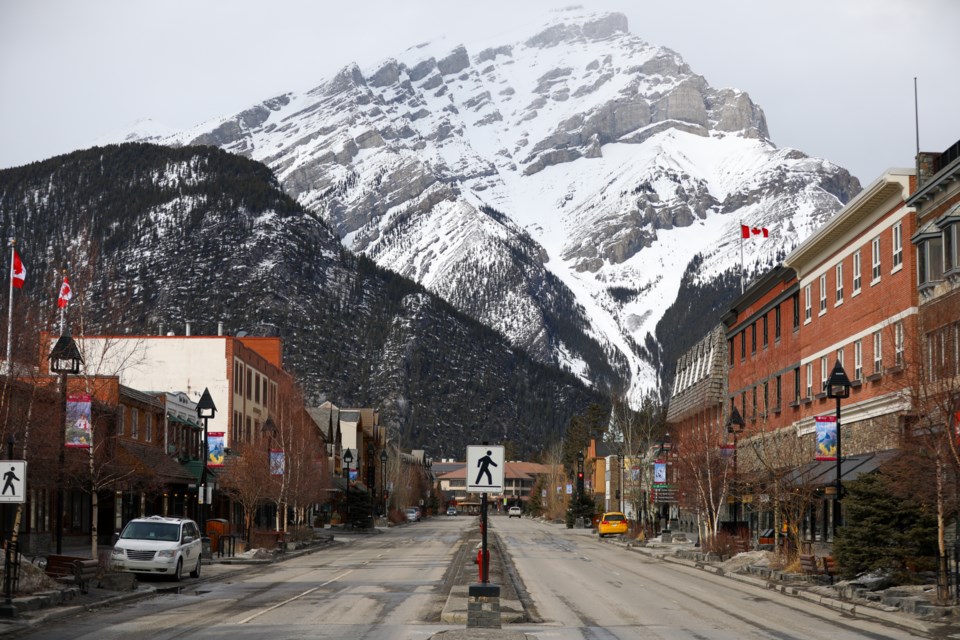BANFF – Businesses in Banff know financial help is on the way to help ease the burden of the devastating blow the COVID-19 pandemic has had on the tourist town – but some still fear businesses may shut doors forever.
Canada’s six biggest banks are offering a six-month payment deferral on mortgages, provincial and federal governments have been announcing financial relief packages, as has the Town of Banff with its tax and utility deferral programs.
“There’s a lot of fear around the economy,” said Mayor Karen Sorensen.
“But these are the moments when I as the mayor, and all of us, realize that we are really a small town in Alberta with a very strong community.”
Banff Caribou Properties, one of Banff’s largest employers and commercial landlord, has gone from about 800 staff to approximately 100 through a combination of layoffs and people leaving because of a lack of work.
Company officials say the company fully recognizes the need for rent deferral programs and is committed to preserving tenant base through these trying times, but is waiting on provincial and federal relief packages to kick in.
“We don’t have any cross-the-board deferral programs at this point, but will certainly be at a minimum, passing on any deferrals or government assistance that we can secure,” said Gordon Lozeman, the company’s president and CEO. “The problem is, all of these things take time.”
Lozeman said the public health emergency is also an “economic pandemic.”
“Almost all businesses are closed, including our own, so everyone is understandably just trying to stop the bleeding and preserve cash,” said Lozeman.
“I’m just hoping we’ll get some positive news sometime soon, because you need money to flow to avoid a complete meltdown,” he added.
“The last thing we want is empty commercial spaces, but if this keeps up much longer, it will be inevitable.”
A thriving economy before the pandemic, Banff National Park was spared the financial struggles in recent years experienced by Alberta communities reliant oil and agriculture, due to record visitation of more than four million visitors a year.
Now, an estimated 85 per cent of Banff’s workforce has been laid off in the last few weeks and Parks Canada has closed national parks to visitors to help slow the spread of COVID-19, which has now killed nine people in Alberta.
Hotels are hovering at less than three per cent occupancy and retailers have closed up shop, with restaurants only allowed to offer takeout or delivery services under aggressive new provincial measures.
On Friday (March 27), Parks Canada offered some financial relief to tourism operators in Banff National Park by deferring payments on commercial leases and licences of occupation without interest until Sept. 1.
Officials say operators are being contacted directly by Parks Canada staff.
Jonathan Wilkinson, the Minister of Environment and Climate Change responsible for Parks Canada, said the federal government is doing everything it can to support workers and businesses in the face of the COVID-19 pandemic.
“The measures that we are taking will ensure that tourism businesses in Parks Canada places across the country can defer lease payments until September without interest,” he said in a news release.
Banff and Lake Louise Hospitality Association (BLLHA) had been working hard to convince Parks to either immediately waive or defer all commercial rent payments for at least three months, or until evidence shows the tourism economy has begun to recover from the crisis.
“BLLHA is pleased with the quick response of the Parks Canada Agency to our request to defer lease payments,” said Darren Reeder, BLLHA’s executive director.
In the short-term, Reeder said that the lack of business liquidity is the single biggest issue threatening the survival of many small- to medium-sized businesses.
“This is certainly the case within the broader tourism industry, and particularly so within the mountain national parks region where tourism is the economy’s only market driver,” said Reeder.
The federal government last week announced increased wage subsidies for businesses of 75 per cent, emergency loans and GST deferral.
BLLHA had been advocating for the expansion of the federal wage subsidy program to at least 70 per cent of wages.
“The 75 per cent subsidy announced Friday is much closer in line with aggressive measures taken by countries like New Zealand to assist businesses in retaining workers on payroll,” said Reeder.
“It is one thing for government to help shelter business assets during this unprecedented crisis; it’s quite another to backstop the majority of wage earnings. Both, however, are essential to the tourism industry being able to recover from the COVID pandemic.”
Reeder said it doesn’t do a business any good if it’s lost the core of its systems, technical, financial and key service personnel during this crisis.
“Being able to turn the lights on after this crisis to welcome visitors to our national park communities is a given,” he said. “But having the necessary staff in place to deliver is everything.”
Follow RMOToday.com's COVID-19 special section for the latest local and national news on the coronavirus pandemic, as well as resources, FAQs and more.







